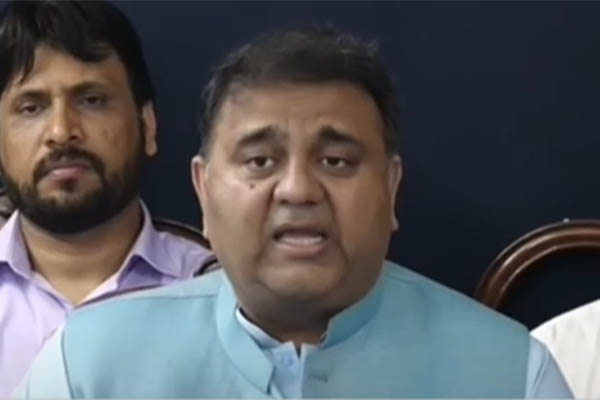
File photo of Chaudhry Fawad Hussain
The Pakistan Tehreek-e-Insaf (PTI) on Thursday submitted to the Supreme Judicial Council, and within hours withdrew, a reference against Chief Election Commissioner Sikandar Sultan Raja, claiming it wished to add more evidence and highlight further legal aspects.
Speaking to journalists in Islamabad, PTI leader Chaudhry Fawad Hussain said the reference would be re-submitted after more evidence had been added against the CEC, including allegations that the initial verdict in the prohibited funding case had been altered.
The originally filed reference had urged the SJC to order the removal of the CEC over the “commission of continuous and deliberate misconduct.” It alleged that a delegation of the Pakistan Democratic Movement (PDM) had met the CEC and four other members of the Election Commission of Pakistan (ECP) on July 29 to “pressure” him into announcing the verdict on the PTI prohibited funding case. It is unclear how this would differ from the meetings the PTI leadership had with the ECP prior to it announcing its verdict on the disqualification of 25 dissident members of the Punjab Assembly.
According to the reference, the ECP only issued its verdict—on a case that had been pending since 2014 and whose verdict had been reserved in July—due to its meeting with the PDM and by doing so the CEC had allegedly violated his oath. The reference maintained the ECP’s decision was illegal, unlawful and coram non judice, i.e. before a court that lacks the authority to hear and decide the case. However, the Islamabad High Court had earlier ruled the ECP was the relevant court to decide the case.
Noting that the PTI intended to challenge the order in court, the reference said the CEC had violated the ECP’s code of conduct and failed to fulfil his constitutional obligations. The code of conduct for judges of the superior judiciary applied to the chief election commissioner as well, the PTI said, adding that a high court judge never discussed pending cases with any person or institution.
“The CEC must be removed from one of the most respectable and sacred constitutional posts,” it added.
The reference also questioned the CEC dismissing several PTI applications seeking delays in the prohibited funding case, including a request to conduct a joint hearing in funding cases of PTI and other parties. It said the Islamabad High Court had asked the ECP to extend equal treatment to all political parties and to hear their cases with due diligence and conclude these within a reasonable time—though the ruling did not specify any need to hear the cases simultaneously.
It was a routine matter that judges of the Supreme Court meet members of the Pakistan Bar Council, the Supreme Court Bar Association and other lawyer forums, but it had been observed recently that the apex court refused to meet a delegation of the SCBA during hearing of the suo motu petition under Article 184(3) of the Constitution in the “Pervaiz Elahi versus Deputy Speaker, Punjab Assembly” case since it was one of the parties in the proceedings, it said. The same rule applied to the CEC, the reference said, but he not only met the PDM delegation but also admitted that a discussion did take place on the timing of the judgement in PTI prohibited funding case. A key point that appears to have been ignored in this submission is that the PDM was never party to the prohibited funding case; it had been filed by PTI founding member Akbar S. Babar, who was the petitioner.
